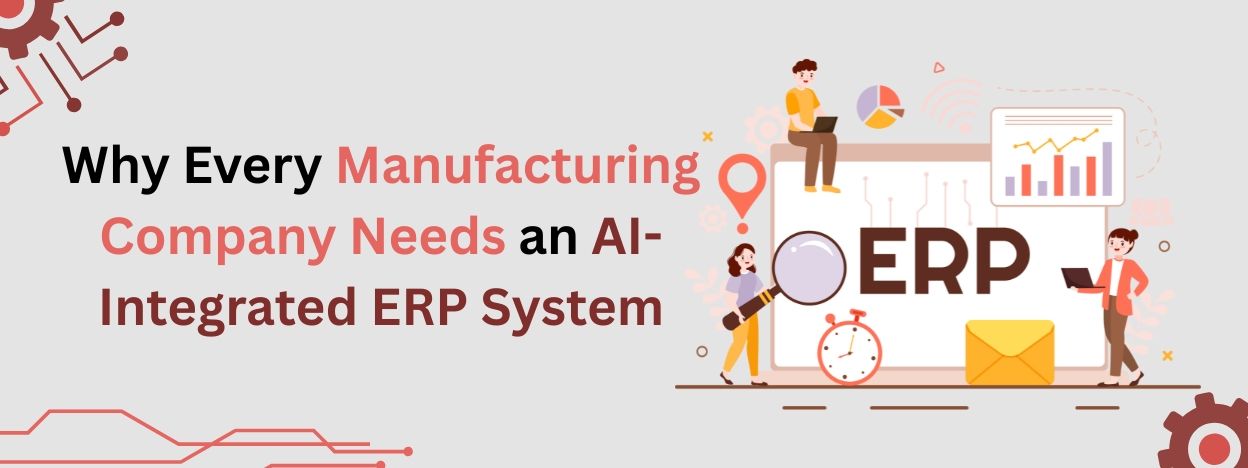Why Every Manufacturing Company Needs an AI-Integrated ERP System

In the fast-paced world of manufacturing, efficiency, accuracy, and agility are no longer optional — they’re essential. As manufacturers face challenges like fluctuating market demand, supply chain disruptions, and increasing competition, many are turning toward digital transformation. At the heart of this transformation lies one powerful solution: the AI-integrated ERP system.
Let’s explore why every manufacturing company — whether small, medium, or enterprise-level — needs to adopt AI-powered ERP software to stay competitive, efficient, and future-ready.
1. Traditional ERP Systems Are No Longer Enough
Traditional ERP (Enterprise Resource Planning) systems have long been the backbone of manufacturing operations, streamlining processes like inventory management, production planning, procurement, and finance.
However, legacy ERP systems are mostly reactive — they record and display data but lack the intelligence to predict, adapt, and optimize operations in real time.
AI bridges this gap by adding a layer of intelligence that helps companies make proactive decisions, forecast outcomes, and automate routine tasks with precision.
2. Smarter Demand Forecasting & Inventory Optimization
Manufacturers often struggle with balancing inventory — too much leads to high holding costs, while too little results in lost sales and production delays.
An AI-integrated ERP system can analyze years of historical sales data, seasonal trends, and even external factors like market shifts or weather conditions to accurately forecast demand.
This helps in:
- Reducing excess inventory and waste
- Ensuring raw materials and finished goods are available when needed
- Minimizing stockouts and overproduction
The result: a leaner, more cost-efficient operation.
3. Real-Time Quality Control & Predictive Maintenance
Manufacturing equipment downtime can cost companies millions. AI-driven ERP systems can prevent this with predictive maintenance.
By analyzing sensor data from machines, the ERP can detect patterns that indicate early signs of failure. This allows maintenance teams to take action before breakdowns occur, minimizing downtime and maintenance costs.
Additionally, AI-powered quality control tools can analyze product data and automatically flag defects or irregularities in real time — ensuring that every batch meets high-quality standards.
4. End-to-End Supply Chain Visibility
Modern supply chains are global, complex, and interconnected — which makes them vulnerable to disruptions.
AI within ERP systems provides end-to-end visibility into the entire supply chain. It tracks every component, supplier, and shipment in real time, using predictive analytics to identify risks such as delays or shortages before they escalate.
Manufacturers can then reallocate resources, adjust production schedules, or source alternatives proactively — keeping operations running smoothly even during uncertainty.
5. Enhanced Decision-Making with Data-Driven Insights
AI doesn’t just collect data — it interprets it.
An AI-integrated ERP system uses machine learning algorithms to uncover patterns and insights hidden within massive datasets.
It provides managers and executives with real-time dashboards, AI-driven recommendations, and automated reporting, helping them make smarter, faster, and evidence-based decisions.
From pricing strategies to resource allocation, decision-making becomes data-driven rather than instinct-based.
6. Increased Productivity Through Automation
AI automates repetitive and time-consuming tasks such as:
- Order processing
- Invoice matching
- Production scheduling
- Material requirement planning
This not only saves time but also reduces human error and frees employees to focus on high-value tasks like innovation, strategy, and customer engagement.
Automation powered by AI turns your ERP into an always-on digital assistant that continuously improves operational efficiency.
7. Better Customer Experience and On-Time Delivery
Customers today expect speed, customization, and reliability. AI-integrated ERP systems enable real-time production tracking and order status visibility, helping manufacturers provide accurate delivery timelines and updates.
Predictive analytics also ensures that raw materials and resources are available on time, reducing lead times and enhancing customer satisfaction.
In short, AI transforms the ERP from a backend system into a customer-centric performance driver.
8. Competitive Edge in the Industry 4.0 Era
The manufacturing world is rapidly moving toward Industry 4.0 — a new era defined by smart factories, IoT connectivity, and autonomous systems.
AI-powered ERP systems act as the central nervous system of these smart factories, integrating data from connected devices, machines, and sensors into one intelligent hub.
Companies that embrace AI-integrated ERP early will gain a competitive edge through agility, innovation, and faster adaptation to market demands.
Final Thoughts
The question is no longer “Should manufacturing companies adopt AI-integrated ERP systems?” — it’s “How soon can they?”
In a world where every second counts and every decision impacts profitability, integrating AI into ERP isn’t just a technology upgrade — it’s a strategic necessity.
Manufacturers that invest in AI-driven ERP systems today are positioning themselves for a smarter, more efficient, and resilient tomorrow.
If you are looking for an ERP solution with AI-enabled capabilities, talk with our consultants today to explore how intelligent automation and predictive insights can transform your manufacturing operations.

